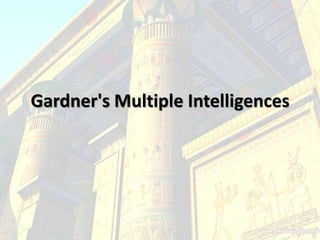Week4
- 3. Linguisticwriters, lawyers, journalists, speakers, trainers, copywriters,English teachers, poets, editors, linguists,translators, PR consultants, media consultants, TV andradio presenters, voice-over artistes
- 4. Logical -mathematicalscientists, engineers, computer experts, accountants,statisticians, researchers, analysts, traders, bankersbookmakers, insurance brokers, negotiators, deal-makers,trouble-shooters, directors
- 5. Musicalmusicians, singers, composers, DJ's, music producers,piano tuners, acoustic engineers, entertainers, partyplanners,environment and noise advisors, voice coaches
- 6. Bodily -Kinestheticdancers, demonstrators, actors, athletes, divers, sportspeople,soldiers, fire-fighters, PTI's, performance artistes;ergonomists, osteopaths, fishermen, drivers, craftspeople;gardeners, chefs, acupuncturists, healers,adventurers
- 7. Spatial - Visualartists, designers, cartoonists, story-boarders, architects,photographers, sculptors, town-planners, visionaries,inventors, engineers, cosmetics and beauty consultants
- 8. Interpersonaltherapists, HR professionals, mediators, leaders,counsellors, politicians, educators, sales-people, clergy,psychologists, teachers, doctors, healers, organisers,carers, advertising professionals, coaches and mentors;(there is clear association between this type of intelligence and what is now termed 'Emotional Intelligence' or EQ)
- 9. Intrapersonalarguably anyone who is self-aware and involved in the process of changing personal thoughts, beliefs and behaviour in relation to their situation, other people, their purpose and aims - in this respect there is a similarity to Maslow's Self-Actualisation level, and again there is clear association between this type of intelligence and what is now termed 'Emotional Intelligence' or EQ
- 11. Adult Learning (Andragogy)Malcolm Knowles (1978, 1990) Adult learners bring a great deal of experience to the learning environment. Educators can use this as a resource.Adults expect to have a high degree of influence on what they are to be educated for, and how they are to be educated.Knowles, M.S. 1990 The Adult Learner: a Neglected Species 4th edition, Houston: Gulf Publishing Company, Book Division
- 12. Theactive participation of learners should be encouraged in designing and implementing educational programs.Adults need to be able to see applications for new learning.Knowles, M.S. 1990 The Adult Learner: a Neglected Species 4th edition, Houston: Gulf Publishing Company, Book Division
- 13. Adult learners expect to have a high degree of influence on how learning will be evaluated.Adults expect their responses to be acted upon when asked for feedbackon the progress of the program.Knowles, M.S. 1990 The Adult Learner: a Neglected Species 4th edition, Houston: Gulf Publishing Company, Book Division
- 14. ˇ®adulthood people are self-directing. This is the concept that lies at the heart of andragogy ... andragogy is therefore student-centred, experience-based, problem-oriented and collaborativevery much in the spirit of the humanist approach to learning and education ... the whole educational activity turns on the student.ˇ®Burns (1995, p.233)
- 15. Constructivismstates that learning is an active, contextualised processof constructing knowledge rather than acquiring it.
- 16. Keywords: Learning as experience, activity and dialogical process; Problem Based Learning (PBL)
- 17. Social Development Theorysocial interaction precedes development; consciousness and cognition are the end product of socialisation and social behaviour.Lev Vygotsky (1896-1934)
- 18. Communities of Practice (CoP)groups of people who share a concern or a passion for something they do and learn how to do it better as they interact regularly
- 19. TaskAnalyse in detail how two principles of learning affect the planning of teaching.


















